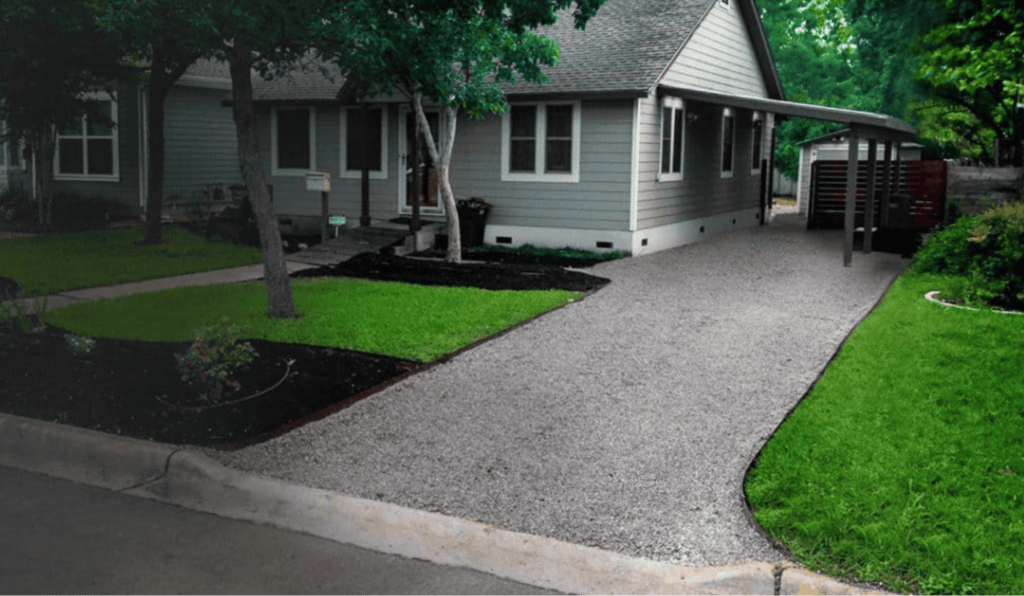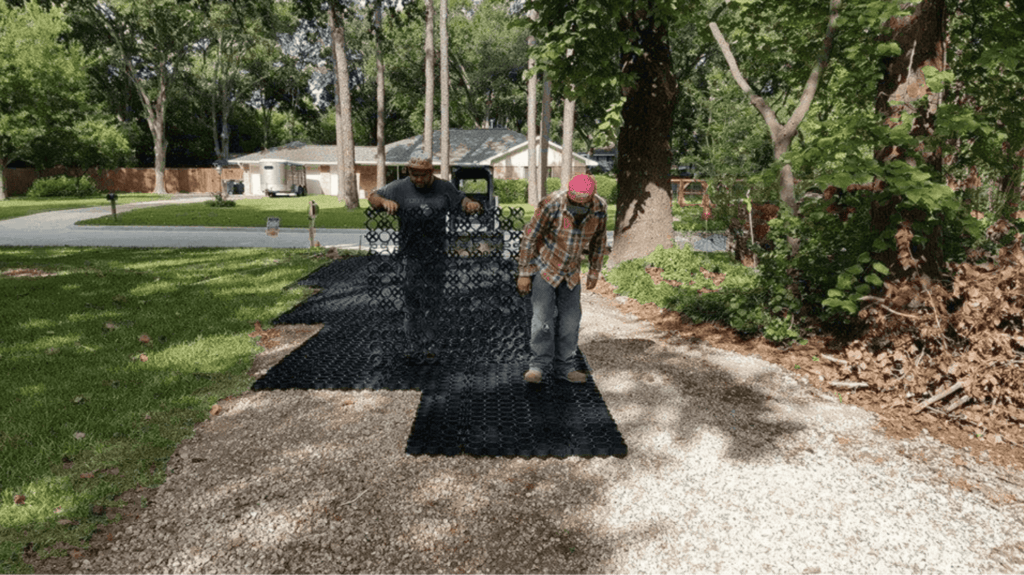Permeable pavers, a key element in sustainable construction, are having a significant impact on landscaping and urban planning. These eco-friendly alternatives to traditional pavement address challenges like stormwater runoff, soil erosion, and pollution.
This guide explores the benefits, installation process, types, and applications of permeable pavers. Whether you’re a homeowner revamping your driveway or a city planner seeking sustainable solutions, this guide has all the information you need.
What is Permeable Paving and How Does it Help You?

Permeable paving allows water to pass through into the soil and gravel layers. It uses unique products with grids or patterns filled with gravel or grass. These robust and durable products can withstand heavy loads and traffic while also maintaining permeability.
They are an eco-friendly paving solution that can enhance the landscape’s aesthetic appeal. These products help mitigate urban heat islands and reduce stormwater runoff, a concern in urban areas. They are easy to install and require less maintenance than traditional pavement, which makes them ideal for residential and commercial use.
The Benefits of Installing Permeable Paving

One of the most substantial benefits of permeable paving is its positive impact on the environment:
- By allowing water to seep through its surface and into the ground beneath, permeable pavers help in replenishing groundwater reserves—a crucial aspect in regions prone to drought or water scarcity.
- Another significant advantage is the filtration of pollutants. As the water passes through the layers of the pavers and into the soil, harmful pollutants are naturally filtered out to protect local waterways from potential contamination.
- Permeable pavers also contribute to urban heat island mitigation. Unlike traditional pavement materials that absorb and radiate heat, permeable pavers have a lower thermal mass that reflects more sunlight and absorbs less heat, which helps in reducing the overall temperature in urban areas.
From a practical perspective, permeable pavers are easy to install and maintain. They are also highly durable, capable of withstanding heavy loads and traffic—ideal for driveways, parking lots, and pedestrian walkways.
Permeable pavers offer aesthetic appeal with their unique designs and patterns, to enhance the visual aspect of the landscape.
Traditional drainage systems require separate areas to collect and manage stormwater. With permeable pavers, the stormwater management function is integrated within the paved area itself, to eliminate the need for additional land space for drainage.
This is especially valuable in urban environments where land is a premium resource.
In terms of design capabilities, permeable pavers offer versatility and elegance. They come in a variety of shapes, sizes, and colors, to provide countless design options to suit any architectural style or personal preference. Moreover, they can be arranged in multiple patterns — from herringbone and circular to running bond — to enhance the visual appeal of driveways, walkways, and patios.
Permeable pavers play a crucial role in preventing soil erosion. In conventional paving, the surface runoff generated during heavy rainfall can lead to erosion of the surrounding landscape. In contrast, permeable pavers allow rainwater to infiltrate directly into the ground, which reduces the volume and velocity of runoff, and thereby minimizes the risk of erosion.
Environmental Impact of Permeable Paving
Permeable paving products are designed to be robust and long-lasting. Their high-quality construction typically involves the use of recycled plastic, which contributes to an extended lifecycle and a reduced environmental footprint. The durability of pavers ensures that they can withstand heavy loads and high traffic to retain their integrity over time.
Their resistance to cracking and breaking translates to lower maintenance costs which makes them a cost-effective solution for paving.
High Quality Research Backs Up The Claims of Environmental Friendliness
Numerous studies and research papers have corroborated the benefits of permeable pavers:
- A study published in the Journal of Environmental Management highlights the effectiveness of permeable pavers in reducing stormwater runoff.
A report from the United States Environmental Protection Agency (EPA) highlights the cost-effectiveness and environmental advantages of permeable pavers. According to the report, “Permeable pavements can offer multiple benefits as they provide surfaces for both vehicles and pedestrians while reducing stormwater discharges.”
These research findings provide strong evidence supporting the numerous benefits of permeable pavers, to reinforce their role as an integral part of sustainable urban planning and design.
Versatility in Action: Materials and Spaces for Permeable Pavers
Permeable paving can be created using various materials, each providing a unique aesthetic and benefit:
- Concrete is a great option because it’s strong and durable, able to handle heavy loads and high traffic. Plus, it gives a sleek, modern appearance to any landscape and requires minimal upkeep.
- Asphalt permeable paving combines the strength of traditional asphalt with the sustainability of permeability.
- Gravel-based permeable paving, often incorporated with recycled plastic grids, is another versatile option. It is ideal for a natural, rustic aesthetic and excels in areas prone to erosion. The plastic grids provide structure and stability to the gravel, preventing displacement from foot or vehicle traffic.
- Grass can also be used as part of a permeable paving solution. A grid system is typically used to protect the grass roots and maintain the structure of the surface, while still permitting water to percolate through.
TRUEGRID® Pavers Lead the Industry

TRUEGRID® offers a range of high-quality permeable pavers that stand out for their durability, versatility, and environmental friendliness. Here’s a look at some of their notable products:
TRUEGRID® PRO PLUS®: This professional-grade permeable paver is designed for heavy-duty applications. It’s an ideal solution for commercial parking lots, driveways, and other high-traffic areas. Made from 100% post-consumer recycled high-density polyethylene, it’s a green choice that doesn’t compromise on performance.
TRUEGRID® PRO LITE: This product is perfect for lighter traffic areas such as residential driveways and patios. Like the PRO PLUS®, it’s made from 100% recycled materials, and supports grass or gravel fill.
TRUEGRID® ROOT®: This grass paver is designed for areas where natural aesthetics are essential. It provides the strength and durability of a paved surface while allowing grass to grow, to create a visually pleasing green surface that’s also robust and permeable.
Each TRUEGRID® product is designed with ease of installation in mind and backed by a commitment to customer service, which makes them a preferred choice for various landscaping and construction projects.
Best Applications for Permeable Paving
Permeable paving can be utilized in a range of locations, both residential and commercial, by playing a vital role in sustainable landscaping and construction. Here are a few examples:
Residential Driveways and Walkways

Permeable pavers are an excellent choice for homeowners looking for a sustainable, aesthetically pleasing way to pave driveways and walkways. They help in managing rainwater runoff and can enhance the beauty of the property.
Parking Lots

Commercial parking lots often face issues with water accumulation during heavy rainfall. Permeable paving not only mitigates this problem, but also delivers a sturdy, low-maintenance, and long-lasting surface that can withstand heavy vehicular traffic.
Public Parks and Green Spaces

Public parks and green spaces can benefit from the use of grass permeable pavers, which provide the necessary structural support while maintaining the grassy aesthetics and contributing to groundwater recharge.
Patio Areas and Courtyards

Permeable pavers can create beautiful, functional, and sustainable patio areas and courtyards. They provide an excellent solution for managing rainwater, particularly in urban settings.
Emergency Access Routes
Due to their strength and durability, permeable pavers are also suited for emergency access routes, and can help to ensure that critical paths remain accessible and functional regardless of weather conditions.
Golf Courses and Sports Fields

On golf courses and sports fields, permeable pavers can help manage water drainage, reduce water logging, and maintain the integrity of the playing surface.
Each of these locations stands to gain significant benefits from the use of permeable pavers, further underscoring their versatility and value in a wide range of settings.
How to Install Permeable Pavers
The installation of permeable pavers involves a few steps that should be meticulously followed to ensure a durable, functional, and aesthetically pleasing surface.
Step 1: Site Preparation
Start by excavating the site to the required depth, considering the anticipated load and existing soil conditions. Remove all vegetation and organic materials. Compact the native soil.
Step 2: Place Landscape Fabric
Place and overlap a porous, non-woven landscape fabric. Cover the entire excavated area and bring the fabric up the sides of the excavation walls. Overlap fabric seams at least 6-inches.
Step 3: Base Layer
Spread a layer of clean, crushed stone at 2-4 inches and compact. Then repeat with another 2-4 inches and compact. A compactable “road base” or dense base material should be used for grass installations.
Step 4: Paver Installation
Lay the TRUEGRID® pavers onto the base layer, connecting them as you go. The lightweight, interlocking design makes this process quick and straightforward.
Step 5: Fill Material
Once the pavers are installed, fill them with your chosen fill material, such as gravel or soil and grass seed. Make sure to spread the material evenly to ensure a smooth surface.
Remember, always refer to the manufacturer’s specific installation instructions for the best results.
The Costs of Permeable Paving
It’s important to note that costs can vary based on factors like project size, site preparation needs, and regional labor rates. Moreover, the potential to reduce stormwater runoff and related costs can make permeable pavers a cost-effective solution in the long run.
Contact us here for more information.
Permeable Paver Maintenance
Maintaining TRUEGRID® Permeable Pavers is notably straightforward and cost-effective. Here’s a simple maintenance guide:
Regular Cleaning
Depending on the fill material, occasional sweeping or rinsing may be required to prevent debris accumulation. For pavers filled with gravel or stone, a blower can be used to remove leaves and other debris.
Maintaining Fill Material
Over time and with usage, some gravel fill material might displace. In such cases, additional fill material should be added to keep the surface even and maintain its functionality. Water, fertilize, mow, and dethatch grass areas as needed.
Periodic Inspection
While TRUEGRID® pavers are designed for durability, it’s still a good practice to inspect the paved area periodically for any signs of damage or wear. Early identification of potential issues can prevent more significant problems down the line.
Dealing with Stains
Spilled oil or other substances can be cleaned using a standard degreaser. If a paver section becomes stained irreversibly, one of the advantages of the TRUEGRID® system is that individual pavers can be easily replaced without disturbing the entire surface.
Remember, TRUEGRID® pavers are designed for minimal maintenance, which makes them a sustainable and user-friendly solution for various applications. Always refer to the TRUEGRID® specific maintenance instructions to keep your pavers in optimum condition.
Performance of Permeable Paving
Parking Lot

One notable example of permeable paving in action is the case of Joe Myers Toyota, a leading car dealership located in Houston, Texas. Faced with ongoing issues related to stormwater management and the need for additional parking space, the dealership turned to TRUEGRID® permeable pavers for a solution. The installation of TRUEGRID pavers not only provided ample, robust parking space, but also effectively addressed the stormwater problem.
Driveway

TRUEGRID®’s permeable pavers have also seen successful application in residential driveways. One such instance is highlighted in a project case study involving a home in Austin, Texas. The existing gravel driveway was prone to washouts and required frequent, costly maintenance. After TRUEGRID® permeable pavers were installed, the homeowner saw a significant reduction in maintenance needs and costs.
Road

TRUEGRID®’s permeable pavers have also proven highly effective in road construction, as illustrated by a project case study involving a rural road in Florida. The existing road was susceptible to flooding and erosion, which caused frequent and expensive repair needs. After TRUEGRID®’s permeable pavers were installed, the road demonstrated significantly improved resistance to weather events, with no instances of flooding or washouts, even under heavy rain conditions.
Other Spaces
TRUEGRID® permeable pavers have also been implemented in other spaces beyond parking lots, driveways, and roads. A prime example can be found in a project case study detailing the transformation of an outdoor event space in San Antonio, Texas. This area was often subjected to heavy foot traffic, which led to soil compaction and grass deterioration. With the installation of TRUEGRID® permeable pavers, the space was revitalized for improved durability and aesthetics, as well as excellent drainage.
Compliance of Permeable Pavers
TRUEGRID®’s permeable pavers are not only functional and environmentally friendly, but also conform to a variety of compliance standards, adding to their appeal.
ADA Compliance
TRUEGRID® pavers meet the American Disabilities Act (ADA) requirements, by providing a firm, stable, and slip-resistant surface that is accessible to wheelchairs and does not impede movement.
EPA Compliance
TRUEGRID® permeable pavers align with the Environmental Protection Agency’s (EPA) guidelines on stormwater management. They help reduce stormwater runoff and pollution, and contribute to the preservation of water quality.
LEED Certification
The use of permeable pavers can contribute to Leadership in Energy and Environmental Design (LEED) certification points, under Sustainable Sites and Water Efficiency categories.
These compliance aspects make TRUEGRID® permeable pavers an excellent choice for government and corporate projects striving to meet specific regulatory standards and sustainability goals.
Additional Benefits of TRUEGRID® Permeable Pavers
Noise Reduction
Hard surfaces, such as concrete or asphalt, tend to reflect sound waves, thereby amplifying noise levels. In contrast, the porous nature of permeable pavers absorbs sound waves to mitigate noise pollution. This feature is especially advantageous in urban spaces, where traffic noise can be a disruptive issue.
Reduced Flooding
Flooding is a common concern in many urban and suburban locales, especially areas with inadequate stormwater management systems. The implementation of permeable pavers can significantly contribute to reduced flooding. Unlike traditional paving materials, permeable pavers allow rainwater to seep through their surface, to facilitate natural groundwater recharge. This process effectively minimizes surface runoff in order to prevent the accumulation of water on the surface that could otherwise lead to flooding.
Increased Property Value
Installing permeable pavers can significantly enhance the value of a property. This is not just in terms of aesthetics, but also in improved functionality and sustainability.
TRUEGRID® permeable pavers are an elegant, durable solution for a variety of applications, including driveways, walkways, patios, and more.
Embrace Sustainability and Functionality with TRUEGRID® Permeable Pavers
Don’t wait to make a difference. With TRUEGRID®, you have the opportunity to contribute to a healthier environment while also solving your paving needs. It’s time to choose sustainability and functionality with our permeable paver systems. Let us help you transform your outdoor space into a resilient, eco-friendly, and aesthetically pleasing environment.
Contact our team today for more information and a free estimate!
Frequently Asked Questions
Q1: Can TRUEGRID® permeable pavers be utilized for high-traffic areas, such as commercial parking lots?
A1: Yes, TRUEGRID® permeable pavers are designed to be robust and durable, which makes them an excellent choice for high-traffic areas like commercial parking lots. They can withstand heavy loads and frequent use, while still maintaining their integrity and aesthetic appeal.
Q2: How do TRUEGRID® permeable pavers contribute to environmental sustainability?
A2: TRUEGRID® permeable pavers contribute to environmental sustainability in several ways. Firstly, they aid in effective stormwater management by allowing rainwater to permeate through their surface, to reduce runoff and contribute to natural groundwater recharge. They also meet the Environmental Protection Agency’s (EPA) guidelines on stormwater management, to further cement their role in environmental preservation.
Q3: Can the installation of TRUEGRID® permeable pavers enhance the value of my property?
A3: Absolutely! Besides offering an aesthetically pleasing solution, TRUEGRID® permeable pavers also contribute to the improved functionality and sustainability of your property. By mitigating issues like stormwater runoff and requiring minimal maintenance, TRUEGRID pavers can significantly boost your property’s value.
Glossary
Recharging of Groundwater Levels: This term refers to the natural process of replenishment of existing groundwater reserves. It occurs when rainwater or other surface water seeps into the ground, and moves downward through the soil and rock layers until it reaches the water table. This process is critical in maintaining the overall health of our ecosystems, as it helps to ensure a continuous supply of groundwater for various uses, including drinking, irrigation, and industrial purposes.
Permeable: This term refers to a material’s ability to allow fluids or gasses to pass through it. In the context of pavers, permeable refers to the capability of the paver material to let water infiltrate through its surface into the underlying layers of soil and rock. This permeability aids in managing stormwater runoff, reduces flooding, and promotes the recharging of groundwater levels, to contribute to environmental sustainability.



